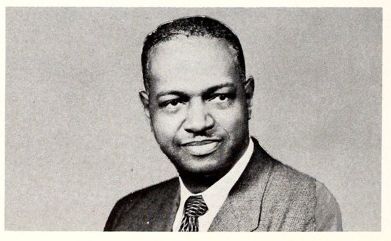Duncan, Samuel Edward, Jr.
by Lois V. Edinger
(27 Apr. 1904–10 July 1968)
 Duncan, Samuel Edward, Jr., educator and college president, was born in Madisonville, Ky., the oldest of seven children of Samuel E. and Lena B. Duncan. At a time when Black Americans did not find it easy to obtain schooling, all of the children were educated and each became a leader in his chosen field. In 1917 the family moved to Salisbury, N.C., where Duncan completed his elementary education in the public schools. After receiving an A.B. degree from Livingstone College in Salisbury, he began teaching science in Washington High School, Reidsville, where he also served as coach from 1927 to 1930. He then attended Cornell University and was awarded an M.A. in education. From 1931 to 1937 he was principal of Dunbar High School in East Spencer; in the summer he renewed his relationship with Livingstone as a visiting instructor. He returned to Washington High School as principal in 1938.
Duncan, Samuel Edward, Jr., educator and college president, was born in Madisonville, Ky., the oldest of seven children of Samuel E. and Lena B. Duncan. At a time when Black Americans did not find it easy to obtain schooling, all of the children were educated and each became a leader in his chosen field. In 1917 the family moved to Salisbury, N.C., where Duncan completed his elementary education in the public schools. After receiving an A.B. degree from Livingstone College in Salisbury, he began teaching science in Washington High School, Reidsville, where he also served as coach from 1927 to 1930. He then attended Cornell University and was awarded an M.A. in education. From 1931 to 1937 he was principal of Dunbar High School in East Spencer; in the summer he renewed his relationship with Livingstone as a visiting instructor. He returned to Washington High School as principal in 1938.
The North Carolina Department of Public Instruction appointed Duncan state supervisor of Black high schools in 1946. Somehow he found time to complete requirements for the Ph.D. in education at Cornell University three years later. Often during the summer he was a visiting instructor at various Black colleges; in each instance he worked to improve the competencies of Black principals and teachers.
On 1 July 1958 Duncan became the fifth president of Livingstone College, serving until his sudden death. Although dedicated to the college and its growth, he was also involved in serving people and numerous causes in the community including the improvement of race relations. He was a tireless worker at local, state, and national levels in the professional teachers' organization. While the state still had dual professional associations, he served on many committees of the North Carolina Teachers Association and finally as its president in 1964–66. When that organization began to work on a merger with the North Carolina Education Association, he was actively involved in the work of the Liaison Committee where his calm manner often helped to reconcile opposing viewpoints. He was serving on the committee at the time of his death. A life member of the National Education Association and of the National Association for the Advancement of Colored People, he also served on the North Carolina State Board of Higher Education and the Southern Regional Education Board. He was president of the North Carolina Council of Churches; vice-president of the Piedmont University Center; and a member of the U.S. Civil Rights Commission, the North Carolina State Welfare Board, the Connectional Budget Board of the A. M. E. Zion Church, and the National Conference of Christians and Jews.
Duncan's service as a college administrator was marked by a sound philosophy of education, a love for people and for learning, and a compassion for students. He was always moved by the poverty and need of a bright young student and he wanted Livingstone to be a "school where no one gets lost." Under his presidency, new buildings were erected on the campus and the faculty and student body were lifted to new academic heights. After his death the Samuel Edward Duncan Memorial Scholarship Fund was established at Livingstone College. On 26 Apr. 1974 the Board of Education of the Salisbury City Schools dedicated the Samuel E. Duncan School to his memory.
On 16 May 1933 Duncan married Ida Hauser of Salisbury; they had two children.
References:
Samuel Edward Duncan Files (Library, Livingstone College, Salisbury).
Lois V. Edinger, interviews with Ida Hauser Duncan and other members of the family.
Additional Resources:
Duncan, S. E. 1955. Some tasks of union school principals in North Carolina. Raleigh: North Carolina Division of Negro Education
Duncan, Samuel Edward. 1960, 1964. President's quadrennial report of Livingstone College, Salisbury, N.C.
Image Credits:
Dr. Samuel Duncan, President Elect. 1958. Livingstonian. https://lib.digitalnc.org/record/37800?ln=en#?xywh=658%2C2463%2C2728%2C1158&cv=17 (Accessed May 1, 2023)
1 January 1986 | Edinger, Lois V.